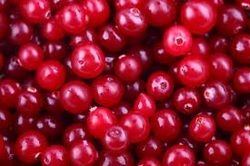
With the holidays upon us, for many it’s the one time of year to eat cranberries, since cranberry sauce is a standard accompaniment to traditional holiday meals. Cranberries, a superfood, are loaded with powerful antioxidants, including vitamin C, proanthocyanidins (a type of flavonoid), and citric acid, that are responsible for many healthful benefits. Cranberries are not just for the holidays.
Cranberries help prevent urinary tract infections (UTI). In a two-year study in Japan that examined the relapse rate in patients with UTI, relapse of 29.1% was observed in women age 50 years or more who drank one bottle (125 mL) of cranberry juice daily. A relapse rate of 49.2% was observed in a similar group who drank a placebo beverage. A nutritional approach to treating UTI can reduce the use of antibiotics and subsequent resistance to antibiotics.
Cranberries may be good for your heart. Researchers at the Boston University School of Medicine examined the effects of cranberry juice on vascular function in subjects with coronary artery disease and found that chronic cranberry juice consumption reduced arterial stiffness. No effect on endothelial function was observed. Other studies show that drinking cranberry juice increases HDL (good) cholesterol, plasma antioxidant capacity and decreases oxidized LDL (bad) cholesterol, which may help maintain health and prevent cardiovascular disease. Cranberries prevent formation of plaque on arterial walls, which decreases the risk of atherosclerosis (hardening of the arteries).
Cranberries may help prevent and fight cancer. Extracts and compounds isolated from cranberry fruit have been shown in studies with in vitro tumor models to inhibit growth and proliferation of several tumor types, including breast, colon, prostate and lung. Antioxidants proanthocyanidin, flavonol, anthocyanin, and triterpenoids are believed to contribute to the anticancer properties and limit carcinogenesis. Studies suggest that cranberries may have a potential role as a dietary chemopreventive.
Cranberries help strengthen your immune system. By neutralizing free radicals, antioxidants in cranberries fight toxins that suppress the immune system, which increases resistance against illness and disease.
Cranberries may help keep your mouth healthy. Oral tissues are delicate and especially vulnerable to cell damage caused by free radicals and oxidative stress. Cranberries are loaded with antioxidants, which help protect against oral diseases and oral cancer.
Cranberries may be good for your brain. Antioxidants in cranberries reduce the amount of oxidative damage to brain cells caused by free radicals that result in fuzzy memory, slow learning, loss of coordination, and often dementias that are common with aging.
Cranberries may be good for your skin. Antioxidants in cranberries can prevent and repair tissue damage due to free radicals. Antioxidants in cranberries can also protect skin from damaging effects of the sun from the inside by protecting cells from damage.
Cranberries keep you looking and feeling younger. Oxidative stress (http://altmedicine.about.com/od/antiagingdiets/a/antiaging_antioxidants.htm) caused by free-radical-induced damage promotes aging. Antioxidants in cranberries fight oxidative stress by neutralizing free radicals, which slows aging.
Cranberries can help you lose weight. Antioxidants in cranberries help regulate metabolism, flush out your system, and ensure normal digestion, all of which can help you lose weight.
So have fun exploring the internet to find your favorite ways to prepare and enjoy cranberries. And this year at your holiday feasts, be sure to pass the cranberries.
Please share your favorite way to enjoy cranberries!
Cranberries help prevent urinary tract infections (UTI). In a two-year study in Japan that examined the relapse rate in patients with UTI, relapse of 29.1% was observed in women age 50 years or more who drank one bottle (125 mL) of cranberry juice daily. A relapse rate of 49.2% was observed in a similar group who drank a placebo beverage. A nutritional approach to treating UTI can reduce the use of antibiotics and subsequent resistance to antibiotics.
Cranberries may be good for your heart. Researchers at the Boston University School of Medicine examined the effects of cranberry juice on vascular function in subjects with coronary artery disease and found that chronic cranberry juice consumption reduced arterial stiffness. No effect on endothelial function was observed. Other studies show that drinking cranberry juice increases HDL (good) cholesterol, plasma antioxidant capacity and decreases oxidized LDL (bad) cholesterol, which may help maintain health and prevent cardiovascular disease. Cranberries prevent formation of plaque on arterial walls, which decreases the risk of atherosclerosis (hardening of the arteries).
Cranberries may help prevent and fight cancer. Extracts and compounds isolated from cranberry fruit have been shown in studies with in vitro tumor models to inhibit growth and proliferation of several tumor types, including breast, colon, prostate and lung. Antioxidants proanthocyanidin, flavonol, anthocyanin, and triterpenoids are believed to contribute to the anticancer properties and limit carcinogenesis. Studies suggest that cranberries may have a potential role as a dietary chemopreventive.
Cranberries help strengthen your immune system. By neutralizing free radicals, antioxidants in cranberries fight toxins that suppress the immune system, which increases resistance against illness and disease.
Cranberries may help keep your mouth healthy. Oral tissues are delicate and especially vulnerable to cell damage caused by free radicals and oxidative stress. Cranberries are loaded with antioxidants, which help protect against oral diseases and oral cancer.
Cranberries may be good for your brain. Antioxidants in cranberries reduce the amount of oxidative damage to brain cells caused by free radicals that result in fuzzy memory, slow learning, loss of coordination, and often dementias that are common with aging.
Cranberries may be good for your skin. Antioxidants in cranberries can prevent and repair tissue damage due to free radicals. Antioxidants in cranberries can also protect skin from damaging effects of the sun from the inside by protecting cells from damage.
Cranberries keep you looking and feeling younger. Oxidative stress (http://altmedicine.about.com/od/antiagingdiets/a/antiaging_antioxidants.htm) caused by free-radical-induced damage promotes aging. Antioxidants in cranberries fight oxidative stress by neutralizing free radicals, which slows aging.
Cranberries can help you lose weight. Antioxidants in cranberries help regulate metabolism, flush out your system, and ensure normal digestion, all of which can help you lose weight.
So have fun exploring the internet to find your favorite ways to prepare and enjoy cranberries. And this year at your holiday feasts, be sure to pass the cranberries.
Please share your favorite way to enjoy cranberries!



 RSS Feed
RSS Feed